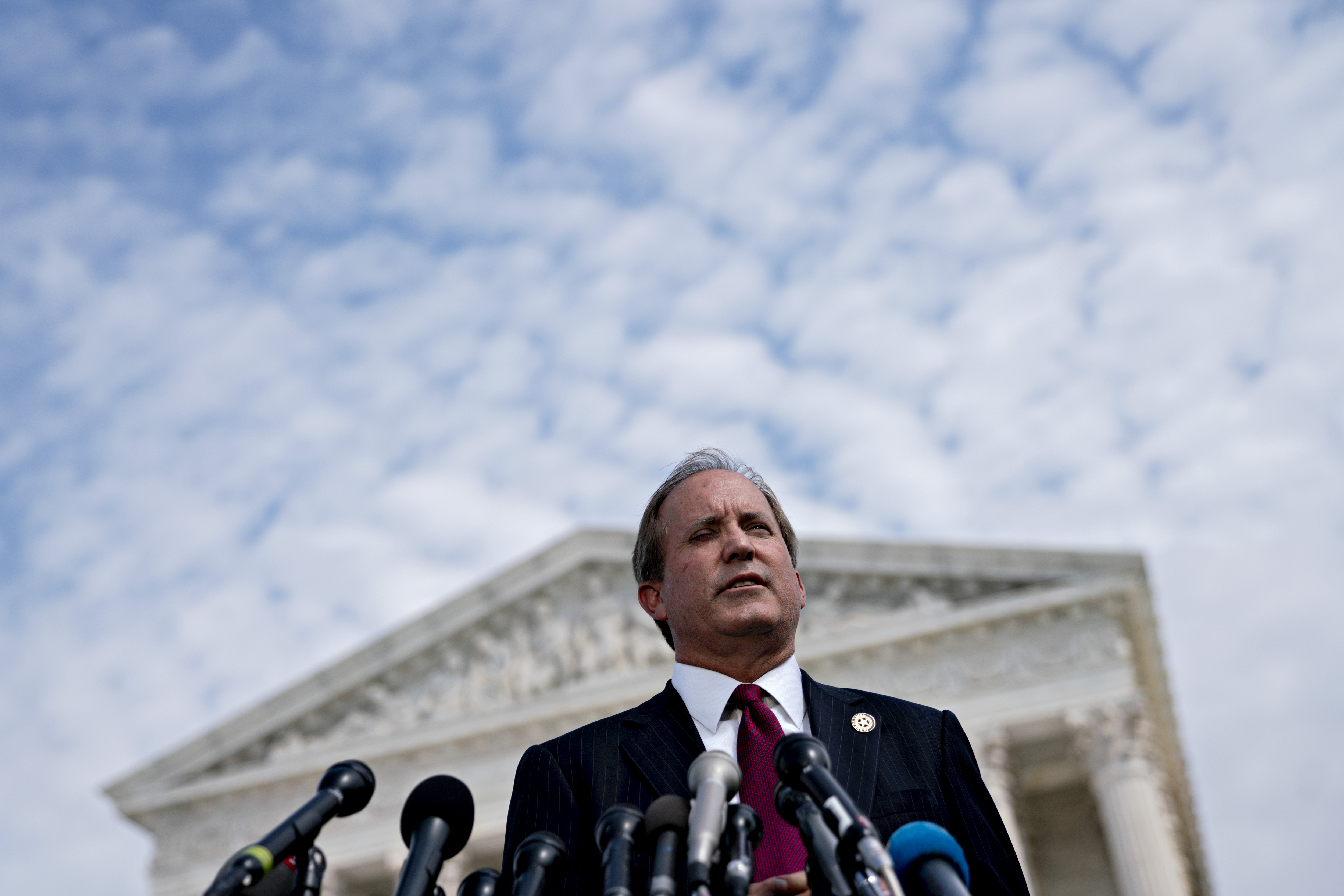Ken Paxton and the scandal splitting the Texas GOP
A series of legal problems are catching up with Texas Attorney General Ken Paxton


A free daily email with the biggest news stories of the day – and the best features from TheWeek.com
You are now subscribed
Your newsletter sign-up was successful
The Republican-led Texas House voted May 27 to impeach state Attorney General Ken Paxton (R). The 121-23 vote, which immediately suspended Paxton from office, came days after the House General Investigating Committee heard unusual public testimony from five veteran investigators who outlined about a dozen state crimes, including felonies, they believe Paxton committed in connection with a whistleblower lawsuit. "That's alarming to hear," committee chairman Rep. Andrew Murr (R) said May 24 after the investigators ran through Paxton's potential crimes. "It curls my mustache." The investigative committee recommended 20 articles of impeachment the following day.
What prompted the investigation?
Murr's committee quietly started investigating Paxton in March following a $3.3 million settlement he reached with four former top aides; Paxton had fired them after they informed the FBI and state authorities of potential crimes he had committed to aid donor and friend Nate Paul, enrich himself, and cover up an extramarital affair. The $3.3 million would come from public funds approved by the Legislature, and House Speaker Dade Phelan (R) said in February he doesn't "think it's proper use of taxpayer dollars." Murr agreed, saying it's "alarming" and "very serious" that Texans are being asked pay millions so Paxton can avoid a public trial.
The dramatic and "extraordinary public airing of scandal and alleged lawbreaking" at the Texas Capitol "plunged one of the GOP's conservative stars into new political and legal risk," testing "Paxton's durability in a way he has not previously confronted despite a felony indictment in 2015 and an ongoing FBI investigation," The Associated Press reported. The vote to impeach him, despite a last-minute plea from former President Donald Trump on Paxton's behalf, "revealed substantial divisions within the Republican Party of Texas — the largest, richest and most powerful state GOP party in the United States," The Texas Tribune said.
The Week
Escape your echo chamber. Get the facts behind the news, plus analysis from multiple perspectives.

Sign up for The Week's Free Newsletters
From our morning news briefing to a weekly Good News Newsletter, get the best of The Week delivered directly to your inbox.
From our morning news briefing to a weekly Good News Newsletter, get the best of The Week delivered directly to your inbox.
The House investigative committee's "three Republicans and two Democrats have demonstrated they take this oversight role seriously" this session, even if the target is a Republican, the Tribune noted. Earlier in May, the committee's investigation of state Rep. Bryan Slaton (R) over sexual misconduct led to his resignation and expulsion.
Phalen and 59 other House Republicans voted to approve the 20 articles of impeachment against Paxton. All 23 no votes were cast by Republicans.
How has Paxton reacted?
Paxton initially took aim at Phalen and the five prosecutors who spent four months poring over documents and interviewing witnesses. "It is not surprising that a committee appointed by liberal Speaker Dade Phelan would seek to disenfranchise Texas voters and sabotage my work as attorney general," Paxton said in a statement May 24. "The false testimony of highly partisan Democrat lawyers with the goal of manipulating and misleading the public is reprehensible." All five lawyers have deep ties to both parties and bipartisan résumés, The Texas Tribune noted.
On May 23, Paxton had roiled the Capitol by calling on Phalen to resign, accusing him of presiding over the House "in a state of apparent debilitating intoxication" a few nights earlier and not passing enough conservative legislation. Phalen's office called Paxton's accusation "little more than a last ditch effort to save face," noting he issued his statement soon after the House investigative committee served his office subpoenas and ordered him to retain records for their investigation.
A free daily email with the biggest news stories of the day – and the best features from TheWeek.com
The question of whether Phalen was drunk or just exhausted after a 14-hour day is "pretty mild" compared to the allegations against Paxton, University of Houston political scientist Brandon Rottinghaus told The New York Times. The Paxton case is "is as detrimental and important a scandal as we've seen in Texas political history," he added, and "we've had some pretty serious malfeasance in Texas history."
After the House impeached him, Paxton lashed out, calling the vote "illegal, unethical and profoundly unjust." He said he looked forward to a quick resolution in the Senate. On May 28, the attorney general's office sent state senators a thick packet of material defending Paxton, including a letter signed by Brent Webster, Paxton's top deputy and the official running the office while he is suspended, The Dallas Morning News reported. Some senators said the packet amounted to jury tampering.
Will Paxton be removed from office?
The House approved 12 impeachment managers on May 29 — seven Republicans, five Democrats — and the Senate accepted the articles of impeachment and instructed Lt. Gov. Dan Patrick (R) to pick a date "not later than" Aug. 28 to start Paxton's impeachment trial. It would take a two-thirds majority of senators to remove him from office. Under Texas law, all 31 senators have to attend the trial, though it isn't clear if Sen. Angela Paxton (R), Ken Paxton's wife, will recuse herself from voting.
Gov. Greg Abbott (R) and Patrick have not publicly defended Paxton since the House investigative committee broadcast the evidence against him, and several senators have said they won't be able to comment on the impeachment case since they are jurors. It isn't clear if the lopsided impeachment vote signaled a collapse of GOP support for Paxton in the state government or just in the House.
"There are certainly battle lines that exist within the Republican Party," Rottinghaus told AP. "I don't think they're ideological. I think you could read into this that the House is tired of being pressured by far-right Republicans, and this is their way of putting in some barriers."
Updated May 31: This article has been updated throughout.
Peter has worked as a news and culture writer and editor at The Week since the site's launch in 2008. He covers politics, world affairs, religion and cultural currents. His journalism career began as a copy editor at a financial newswire and has included editorial positions at The New York Times Magazine, Facts on File, and Oregon State University.
-
 The environmental cost of GLP-1s
The environmental cost of GLP-1sThe explainer Producing the drugs is a dirty process
-
 Greenland’s capital becomes ground zero for the country’s diplomatic straits
Greenland’s capital becomes ground zero for the country’s diplomatic straitsIN THE SPOTLIGHT A flurry of new consular activity in Nuuk shows how important Greenland has become to Europeans’ anxiety about American imperialism
-
 ‘This is something that happens all too often’
‘This is something that happens all too often’Instant Opinion Opinion, comment and editorials of the day
-
 House votes to end Trump’s Canada tariffs
House votes to end Trump’s Canada tariffsSpeed Read Six Republicans joined with Democrats to repeal the president’s tariffs
-
 El Paso airspace closure tied to FAA-Pentagon standoff
El Paso airspace closure tied to FAA-Pentagon standoffSpeed Read The closure in the Texas border city stemmed from disagreements between the Federal Aviation Administration and Pentagon officials over drone-related tests
-
 How are Democrats trying to reform ICE?
How are Democrats trying to reform ICE?Today’s Big Question Democratic leadership has put forth several demands for the agency
-
 Democrats win House race, flip Texas Senate seat
Democrats win House race, flip Texas Senate seatSpeed Read Christian Menefee won the special election for an open House seat in the Houston area
-
 Is Alex Pretti shooting a turning point for Trump?
Is Alex Pretti shooting a turning point for Trump?Today’s Big Question Death of nurse at the hands of Ice officers could be ‘crucial’ moment for America
-
 Halligan quits US attorney role amid court pressure
Halligan quits US attorney role amid court pressureSpeed Read Halligan’s position had already been considered vacant by at least one judge
-
 House approves ACA credits in rebuke to GOP leaders
House approves ACA credits in rebuke to GOP leadersSpeed Read Seventeen GOP lawmakers joined all Democrats in the vote
-
 Vance’s ‘next move will reveal whether the conservative movement can move past Trump’
Vance’s ‘next move will reveal whether the conservative movement can move past Trump’Instant Opinion Opinion, comment and editorials of the day
